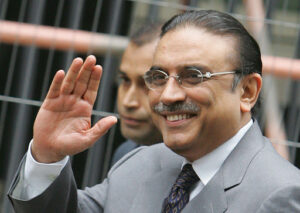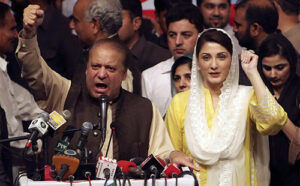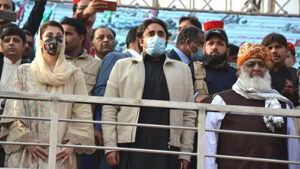Has former president Asif Ali Zardari stabbed democracy in the back by standing up to the pressure of his allies in the Pakistan Democratic Movement (PDM), who wanted the entire opposition to resign from Parliament and storm Islamabad to dislodge the government? Did Zardari really betray the Pakistan Muslim League-Nawaz (PML-N) by installing Pakistan Peoples’ Party (PPP) staunch loyalist, Yousuf Raza Gilani, as leader of the opposition in the Senate?

Many of the PML-N stalwarts, including Nawaz Sharif, his controversial political heir, Maryam, and their allied media persons want the world to believe exactly this; they accuse Zardari and his party of political opportunism, manipulation and striking a deal with Pakistan’s mighty military establishment.
A visibly jolted Maryam Nawaz, who was chanting “Jeay (Long Live) Bhutto” slogans only a few weeks back, took a much-expected U-turn and accused the PPP of dancing to the tune of the “selectors,” which in Pakistan’s political lingo means the military leadership. She got a stinging response from none other than PPP Chairman Bilawal Bhutto Zardari, who satirically remarked that it was a certain political family from Lahore that enjoyed the reputation of being “selected,” not the Bhutto family.
With the PPP and PML-N leaders opening up fronts against each other again, in a stark reminder of their bitter rivalry in the 1990s, and the Awami National Party (ANP) announcing its withdrawal from the PDM, the dream of a united opposition now lies in tatters.
Everything appeared to be going the PDM way when PPP nominee Yousuf Raza Gilani defeated PTI’s high-profile candidate, Dr. Abdul Hafeez Sheikh, in a closely fought contest for the Senate seat from Islamabad. But soon after, the PDM’s defeat in the elections for the Senate Chairman’s slot, despite its majority in the upper house, resulted in fissures in the opposition ranks.
Subsequently, Zardari, with a sleight of the hand, got Gillani, a PPP nominee, elected as leader of the opposition in the Senate, when the PDM had originally agreed to a PML-N nominee as opposition leader. This resulted in a swift and sooner than expected division in the ranks of the opposition. With both sides blaming one another for going against the spirit of the alliance, the strong reaction of the PMLN, whereby they issued notices to both the PPP and the ANP, is seen as a key factor behind the collapse of the alliance.
In the larger interest of the PDM and perhaps also in its own, the PML-N should have conceded the slot of the Senate opposition leader to PPP’s Gilani, instead of kicking up a storm. But when has our political leadership shown any political maturity and sagacity.
The PDM has suffered a huge setback, but does this mean that the alliance is dead? Can the PPP and the PML-N still salvage the situation and chose another day to settle their scores?
Ideally, both parties should refrain from winding up the PDM so long as the PTI is in power and the government-backed accountability process continues to haunt their leadership, even if there has been no closure of cases.
However, the tidings from the opposition camp are not good. It’s a free-for-all as each party tries to make the most of a difficult situation. Even if the PDM survives, it will not be able to execute its extreme confrontationist positions, including tendering resignations from Parliament which the father-daughter duo of Nawaz-Maryam, the small coterie of their loyalists and Maulana Fazl-ur Rehman of the Jamiat Ulema-e-Islam (JUI-F) so desperately desire.
In fact, Zardari has emerged as the unlikely hero, who managed to bring some semblance of stability to the present crisis-ridden system by effectively blocking the extremist, confrontationist and adventurous line of Nawaz Sharif & Co. Not just Prime Minister Imran Khan, but whoever is interested in some political stability in Pakistan now owes Zardari a vote of thanks.

By refusing to resign from Parliament, the PPP effectively scuttled the hardliners’s plan to descend on Islamabad and hold the federal capital hostage. Any such development may not have proved successful in removing the government, but it certainly would have exacerbated the prevailing political uncertainty and instability, and compounded the challenges for the government.
Zardari’s stance should not come as a surprise to political pundits, or even the PML-N leaders if they have a basic sense of the political process. Unlike Nawaz Sharif and Maryam, the PPP’s first family has not ended up in a political dead-end street. While both Nawaz and Maryam stand disqualified from holding public office, Asif Zardari and his son, Bilawal, are part of mainstream politics as members of the National Assembly.
Unlike the PML-N, which is in the opposition in its bastion of power, Punjab, the PPP rules Sindh with a comfortable majority. The PPP has a lot to lose if the current political dispensation crumbles prematurely, and that too with no guarantee that in the new order the party’s share in power would be the same, if not bigger. In the current system, the PPP has a lot of space to manoeuvre and even expand itself.
Moreover, despite its candid position on issues such as human rights, the alleged plan to roll back the 18th Amendment or change the current National Finance Commission Award, and its sympathy for provincial causes, the PPP has been measured in its criticism of the military establishment. This strategy stands in contrast to that of Nawaz Sharif, his daughter and their close aides, who have unleashed a vicious campaign against the top military leaders, both in public and privately.
The PPP was quick to distance itself from this highly controversial line, as Zardari hedged his party’s position for the future. Understandably, an experienced Zardari would never allow Nawaz Sharif to use the PPP for his one-sided gains.

Most importantly, no matter what the PDM leadership might say for public consumption, it is quite clear that the opposition alliance is not fighting a battle for democracy or the rights of the people. This united front has been formed as an anti-accountability movement aimed at blunting the accountability process, in which the PDM has been fairly successful.
The PML-N’s direct and indirect allegations that the PPP struck a deal to escape the accountability process can equally be applied to the stalwarts of its own party, starting from Nawaz Sharif, who, in an unprecedented concession, was allowed to go abroad on the pretext of treatment for his failing health, despite his conviction and jail term. Similarly, his daughter was also given relief and allowed to walk out of prison without serving her term. So far, none of the cases against Shahbaz Sharif, his son Hamza, former finance minister Ishaq Dar and other PML-N leaders have been brought to a close. This means, both parties have so far remained unscathed by the accountability process in real terms — much to the chagrin of Prime Minister Imran Khan.
Zardari, despite having a weak hand, played his cards exceptionally well — from initially allowing the PML-N to occupy the driving seat of the PDM, and then working to set the pace and direction of the opposition alliance’s agitational politics, to fighting the Senate elections, in which he managed to grab two more seats for his party — one from Islamabad and the other from Sindh — despite the party’s low numbers.
The PML-N should also be thanking Zardari because, in a way, he saved Nawaz Sharif & Co. from the embarrassment of dissensions, if the leadership had actually asked its lawmakers to tender resignations. It is an open secret that many members of the PML-N stand opposed to the idea of resigning from the assemblies.
In the days to come, Zardari and his party would be angling for bigger exploits in the power corridors, just like Shahbaz Sharif and Hamza, while Nawaz Sharif and Maryam stand further weakened — and sidelined.



